2024年英语中考一般过去时的详细讲解和讲义
文档属性
| 名称 | 2024年英语中考一般过去时的详细讲解和讲义 | 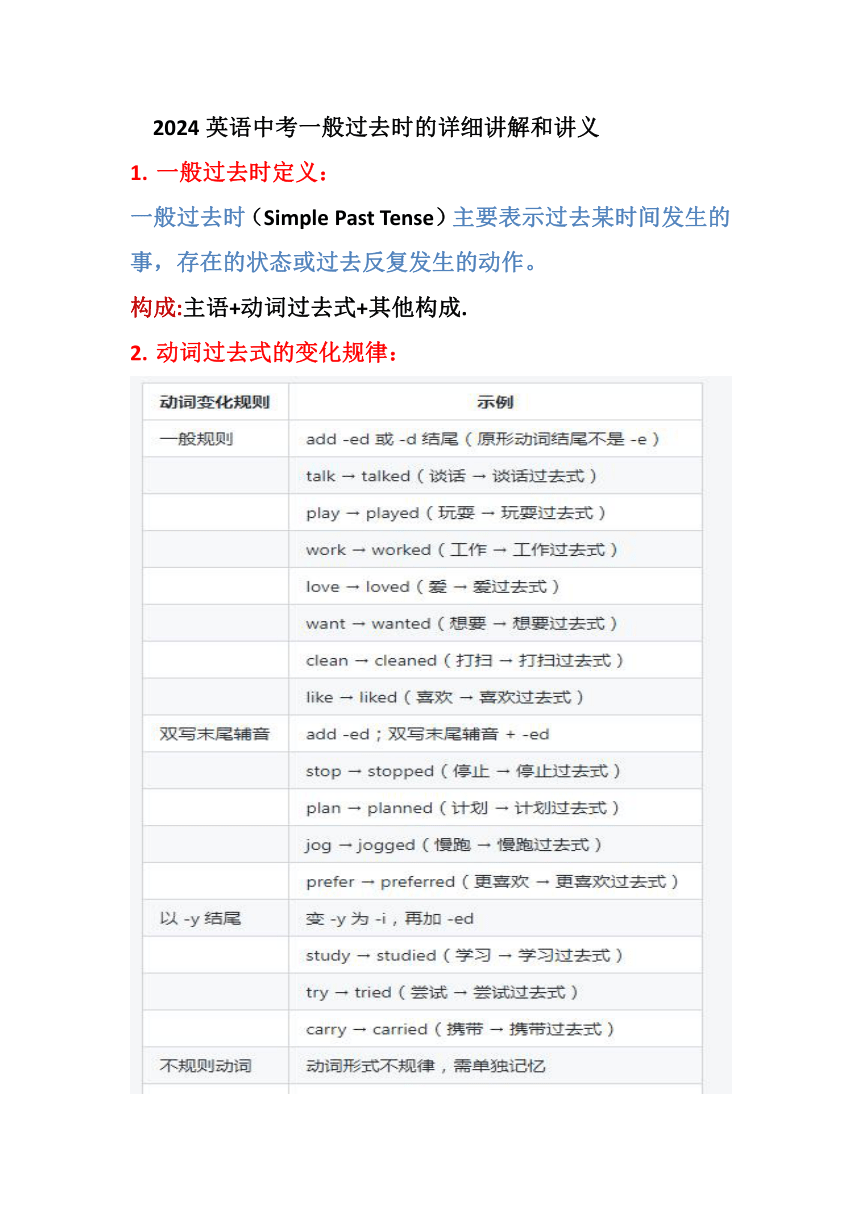 | |
| 格式 | docx | ||
| 文件大小 | 54.4KB | ||
| 资源类型 | 教案 | ||
| 版本资源 | 通用版 | ||
| 科目 | 英语 | ||
| 更新时间 | 2024-01-20 13:32:18 | ||
图片预览

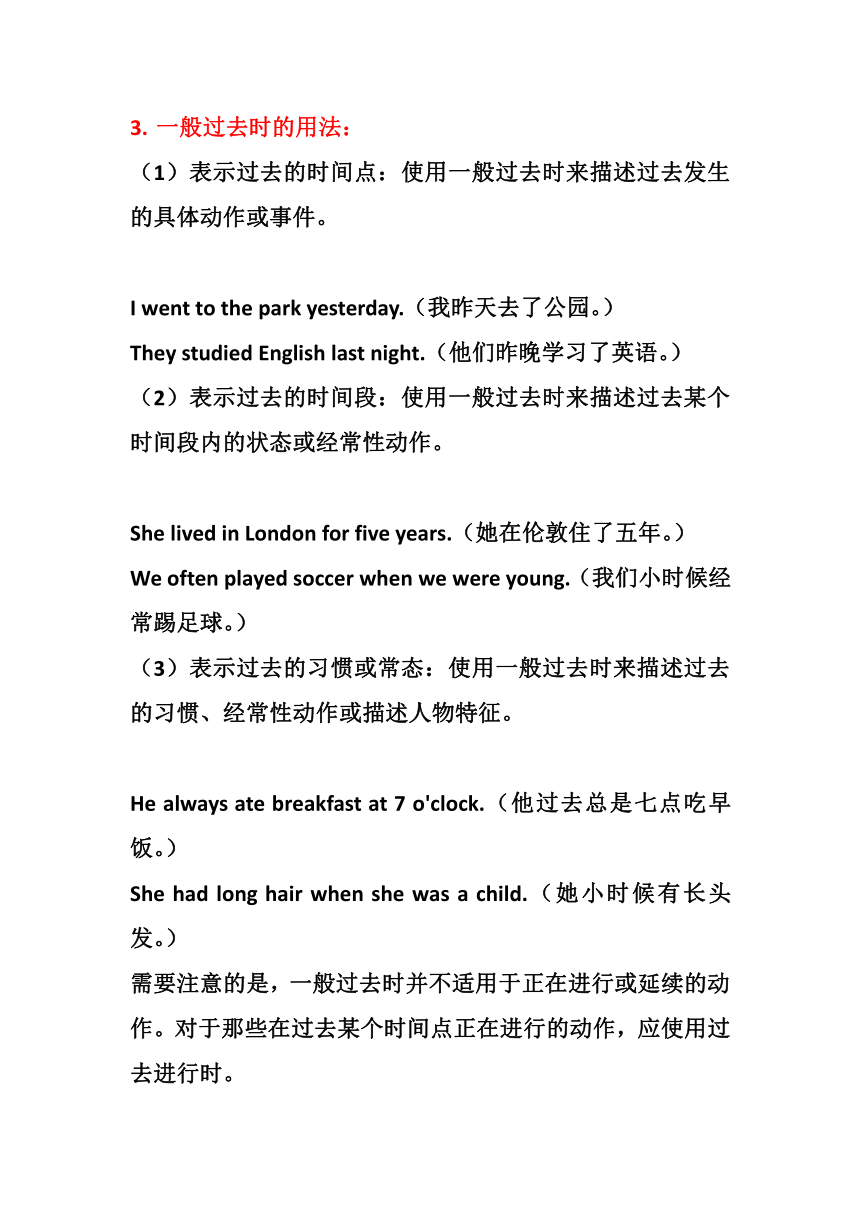
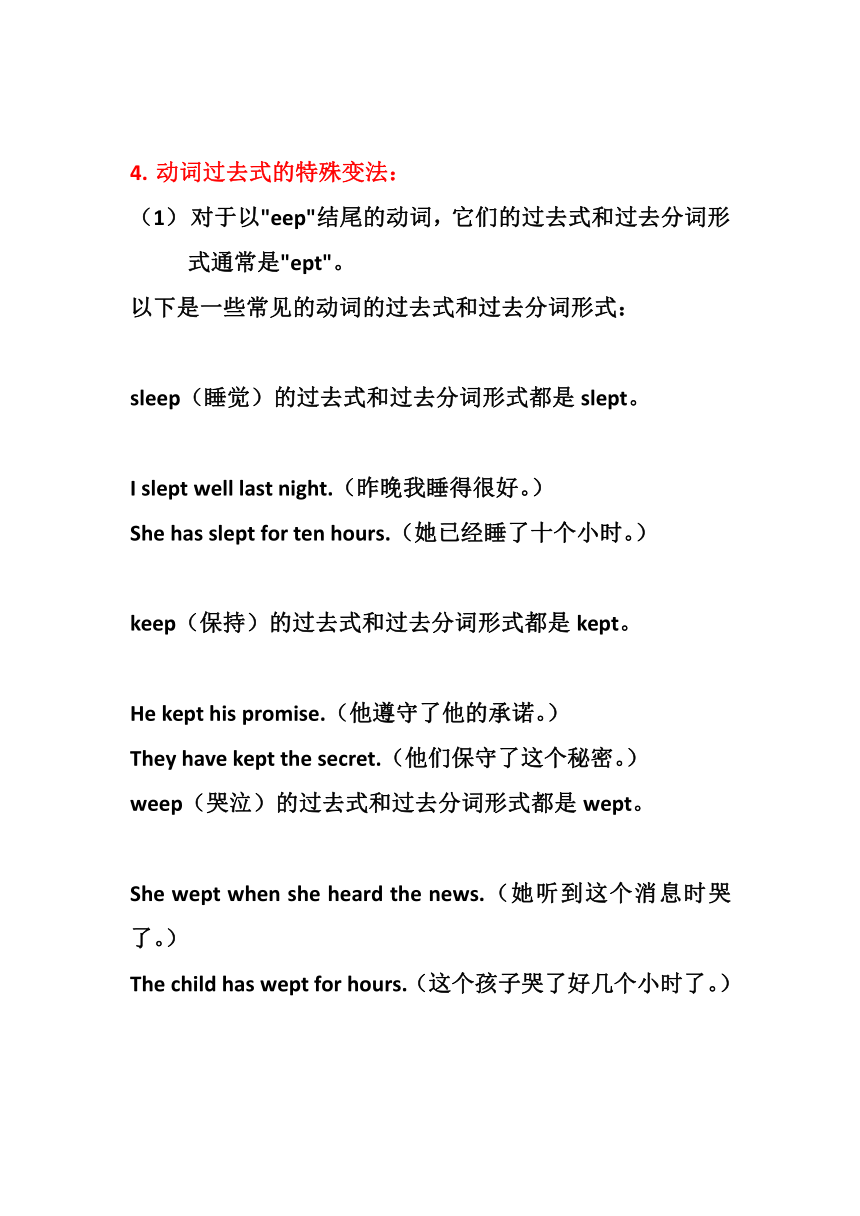
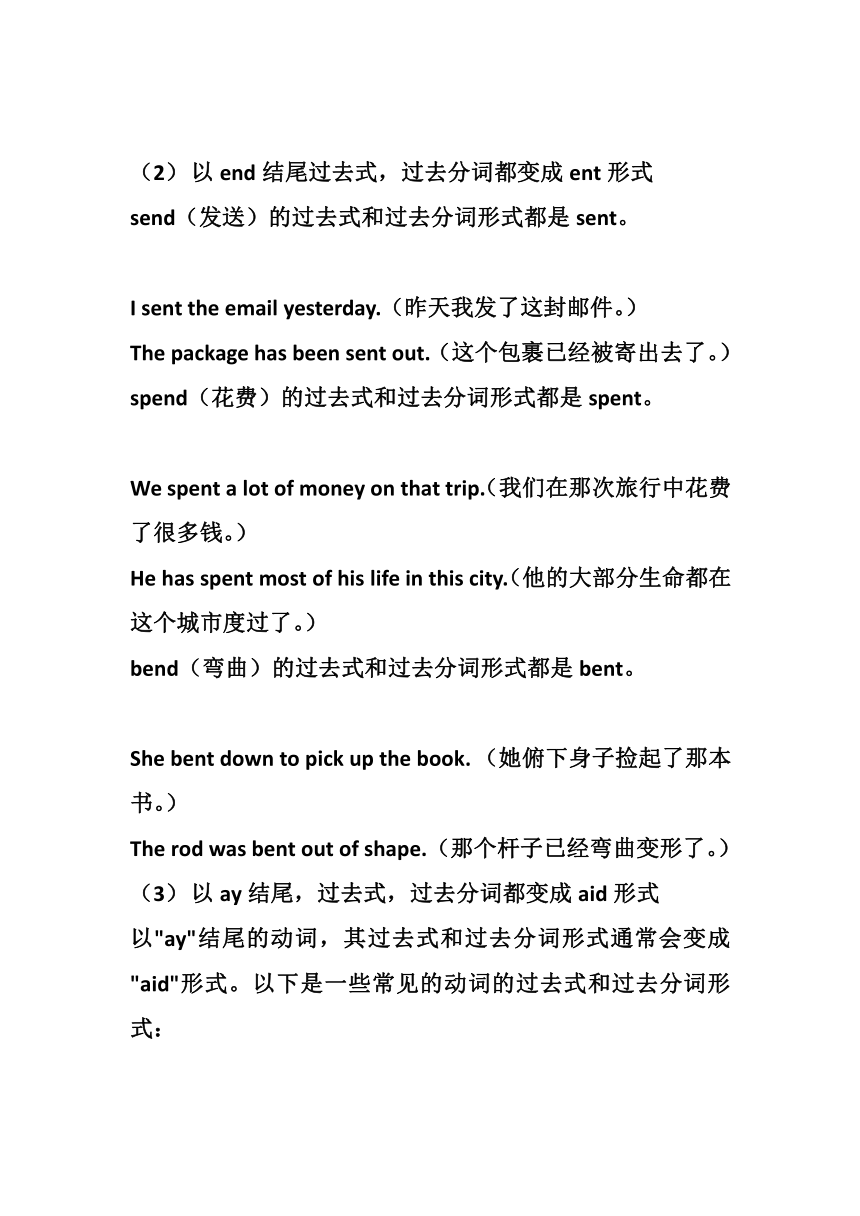
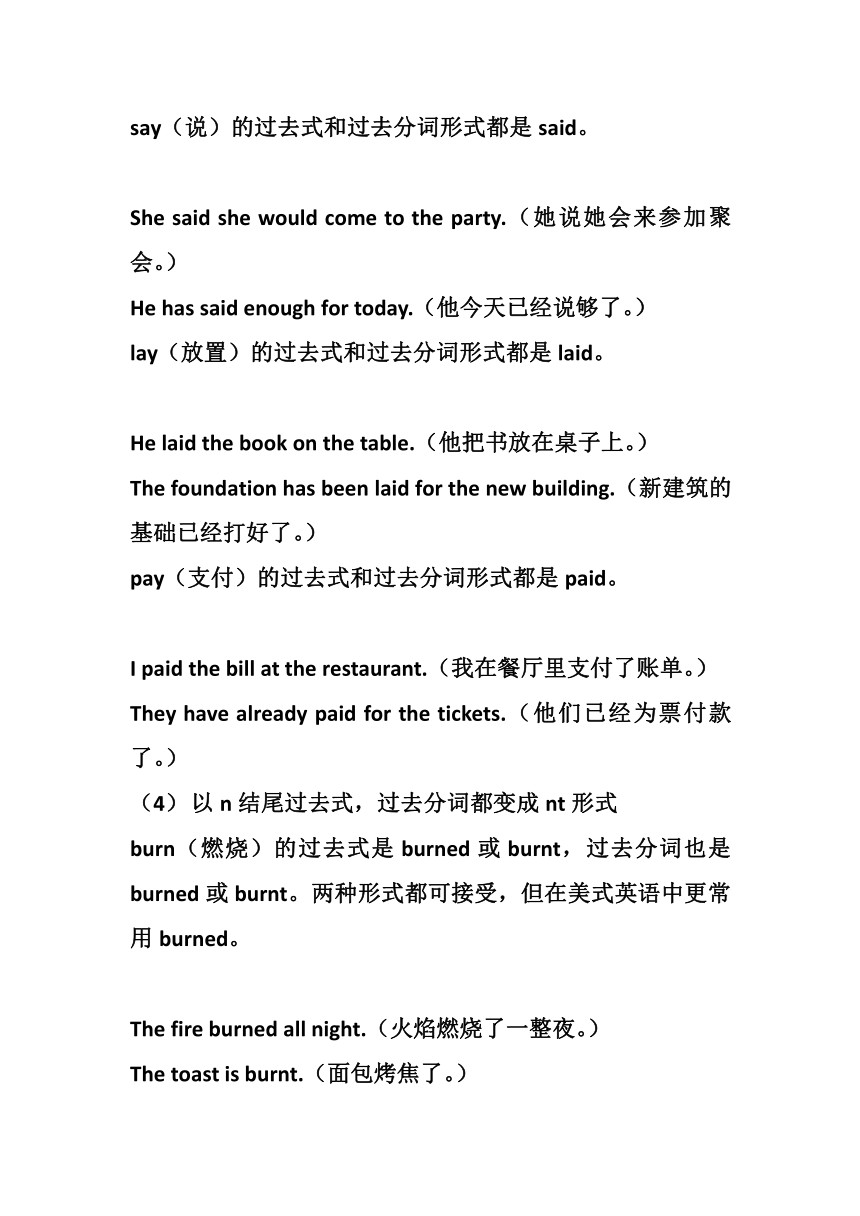
文档简介
2024英语中考一般过去时的详细讲解和讲义
一般过去时定义:
一般过去时(Simple Past Tense)主要表示过去某时间发生的事,存在的状态或过去反复发生的动作。
构成:主语+动词过去式+其他构成.
动词过去式的变化规律:
一般过去时的用法:
(1)表示过去的时间点:使用一般过去时来描述过去发生的具体动作或事件。
I went to the park yesterday.(我昨天去了公园。)
They studied English last night.(他们昨晚学习了英语。)
(2)表示过去的时间段:使用一般过去时来描述过去某个时间段内的状态或经常性动作。
She lived in London for five years.(她在伦敦住了五年。)
We often played soccer when we were young.(我们小时候经常踢足球。)
(3)表示过去的习惯或常态:使用一般过去时来描述过去的习惯、经常性动作或描述人物特征。
He always ate breakfast at 7 o'clock.(他过去总是七点吃早饭。)
She had long hair when she was a child.(她小时候有长头发。)
需要注意的是,一般过去时并不适用于正在进行或延续的动作。对于那些在过去某个时间点正在进行的动作,应使用过去进行时。
动词过去式的特殊变法:
对于以"eep"结尾的动词,它们的过去式和过去分词形式通常是"ept"。
以下是一些常见的动词的过去式和过去分词形式:
sleep(睡觉)的过去式和过去分词形式都是slept。
I slept well last night.(昨晚我睡得很好。)
She has slept for ten hours.(她已经睡了十个小时。)
keep(保持)的过去式和过去分词形式都是kept。
He kept his promise.(他遵守了他的承诺。)
They have kept the secret.(他们保守了这个秘密。)
weep(哭泣)的过去式和过去分词形式都是wept。
She wept when she heard the news.(她听到这个消息时哭了。)
The child has wept for hours.(这个孩子哭了好几个小时了。)
以end结尾过去式,过去分词都变成ent形式
send(发送)的过去式和过去分词形式都是sent。
I sent the email yesterday.(昨天我发了这封邮件。)
The package has been sent out.(这个包裹已经被寄出去了。)
spend(花费)的过去式和过去分词形式都是spent。
We spent a lot of money on that trip.(我们在那次旅行中花费了很多钱。)
He has spent most of his life in this city.(他的大部分生命都在这个城市度过了。)
bend(弯曲)的过去式和过去分词形式都是bent。
She bent down to pick up the book. (她俯下身子捡起了那本书。)
The rod was bent out of shape.(那个杆子已经弯曲变形了。)
以ay结尾,过去式,过去分词都变成aid形式
以"ay"结尾的动词,其过去式和过去分词形式通常会变成"aid"形式。以下是一些常见的动词的过去式和过去分词形式:
say(说)的过去式和过去分词形式都是said。
She said she would come to the party.(她说她会来参加聚会。)
He has said enough for today.(他今天已经说够了。)
lay(放置)的过去式和过去分词形式都是laid。
He laid the book on the table.(他把书放在桌子上。)
The foundation has been laid for the new building.(新建筑的基础已经打好了。)
pay(支付)的过去式和过去分词形式都是paid。
I paid the bill at the restaurant.(我在餐厅里支付了账单。)
They have already paid for the tickets.(他们已经为票付款了。)
以n结尾过去式,过去分词都变成nt形式
burn(燃烧)的过去式是burned或burnt,过去分词也是burned或burnt。两种形式都可接受,但在美式英语中更常用burned。
The fire burned all night.(火焰燃烧了一整夜。)
The toast is burnt.(面包烤焦了。)
learn(学习)的过去式是learned或learnt,过去分词也是learned或learnt。
注意:同样,两种形式都可接受,但在美式英语中更常用learned。
She learned how to swim last summer.(她去年夏天学会了游泳。)
I have learned a lot from this experience.(我从这次经历中学到了很多。)
mean(意味着)的过去式是meant,过去分词也是meant。
What do you mean by that (你那是什么意思?)
His words meant a lot to me.(他的话对我来说意义重大。)
(5)以 -eak 结尾,过去式变成-oke,过去分词变成-oken
speak(讲)的过去式是spoke,过去分词是spoken。
She spoke at the conference yesterday.(她昨天在会议上发言了。)
He has spoken to her about the issue.(他已经和她谈论过这个问题了。)
break(打破)的过去式是broke,过去分词是broken。
He broke his phone when he dropped it.(他把手机摔坏了。)
The vase is broken.(花瓶打破了。)
以 -eal 结尾,过去式变成-ole,过去分词变成-olen。
eal(偷)的过去式是stole,过去分词是stolen。
He stole my wallet while I wasn't looking.(他趁我不注意的时候偷了我的钱包。)
The stolen goods were recovered by the police.(被偷的货物被警方找回了。)
(6)以 -ear 结尾,过去式变成-ore,过去分词变成-orn。
wear(穿)的过去式是wore,过去分词是worn。
She wore a beautiful dress to the party.(她在派对上穿了一件漂亮的裙子。)
The shoes are worn out and need to be replaced.(这双鞋已经磨损了,需要更换。)
tear(撕)的过去式是tore,过去分词是torn。
He tore the paper into pieces.(他把纸撕成了碎片。)
The photograph was torn by accident.(照片被意外地撕破了。)
bear(忍受)的过去式是bore,过去分词是born或borne。"born"通常用于描述出生,"borne"则用于表示承担、忍受的含义。
She bore the pain with a smile on her face.(她微笑着忍受着疼痛。)
He was born in a small town.(他出生在一个小镇上。)
The consequences of his actions must be borne by him.(他必须承担自己行为的后果。)
bear" 和 "tear" 这两个词熟词僻义的表格:
(7)以-ow 结尾,过去式变-ew,过去分词变-own。
throw一threw thrown 扔,投掷
He threw the ball to his friend.(他把球扔给了他的朋友。)
She has thrown away all the old newspapers.(她把所有旧报纸都扔掉了。)
grow--grew-grown成长,生长
The flowers in my garden grew beautifully over the summer.(夏天里,我的花园里的花长得很美丽。)
He has grown into a responsible adult.(他已经成长为一个负责任的成年人。)
know-knew-known知道
I knew that she would be a great fit for the job.(我知道她会非常适合这份工作。)
They have known each other since childhood.(他们从小就互相认识。)
blow-blew-blown 吹
The strong wind blew the leaves off the trees.(狂风吹落了树上的叶子。)
She has blown up dozens of balloons for the [Something went wrong, please try again later.]
(8)中间构成为“辅音+i+辅音”。
-i-的过去式变为-a-,过去分词变为-u-。
sink--sank-sunk下沉 swim--swam--swum游泳 中间构成为“辅音+i+辅音”。
sink
The ship hit an iceberg and sank to the bottom of the ocean.(船撞上冰山后沉入海底。)
He had sunk all his savings into that business venture.(他把所有的积蓄都投入到了那个商业项目中。)
swim
We used to swim in the lake every summer when we were kids.(我们小时候每个夏天都在湖里游泳。)
She has swum across the English Channel twice.(她已经两次游过英吉利海峡。)
(9) 过去式和过去分词与原型一样的。有如下动词:
一般过去时定义:
一般过去时(Simple Past Tense)主要表示过去某时间发生的事,存在的状态或过去反复发生的动作。
构成:主语+动词过去式+其他构成.
动词过去式的变化规律:
一般过去时的用法:
(1)表示过去的时间点:使用一般过去时来描述过去发生的具体动作或事件。
I went to the park yesterday.(我昨天去了公园。)
They studied English last night.(他们昨晚学习了英语。)
(2)表示过去的时间段:使用一般过去时来描述过去某个时间段内的状态或经常性动作。
She lived in London for five years.(她在伦敦住了五年。)
We often played soccer when we were young.(我们小时候经常踢足球。)
(3)表示过去的习惯或常态:使用一般过去时来描述过去的习惯、经常性动作或描述人物特征。
He always ate breakfast at 7 o'clock.(他过去总是七点吃早饭。)
She had long hair when she was a child.(她小时候有长头发。)
需要注意的是,一般过去时并不适用于正在进行或延续的动作。对于那些在过去某个时间点正在进行的动作,应使用过去进行时。
动词过去式的特殊变法:
对于以"eep"结尾的动词,它们的过去式和过去分词形式通常是"ept"。
以下是一些常见的动词的过去式和过去分词形式:
sleep(睡觉)的过去式和过去分词形式都是slept。
I slept well last night.(昨晚我睡得很好。)
She has slept for ten hours.(她已经睡了十个小时。)
keep(保持)的过去式和过去分词形式都是kept。
He kept his promise.(他遵守了他的承诺。)
They have kept the secret.(他们保守了这个秘密。)
weep(哭泣)的过去式和过去分词形式都是wept。
She wept when she heard the news.(她听到这个消息时哭了。)
The child has wept for hours.(这个孩子哭了好几个小时了。)
以end结尾过去式,过去分词都变成ent形式
send(发送)的过去式和过去分词形式都是sent。
I sent the email yesterday.(昨天我发了这封邮件。)
The package has been sent out.(这个包裹已经被寄出去了。)
spend(花费)的过去式和过去分词形式都是spent。
We spent a lot of money on that trip.(我们在那次旅行中花费了很多钱。)
He has spent most of his life in this city.(他的大部分生命都在这个城市度过了。)
bend(弯曲)的过去式和过去分词形式都是bent。
She bent down to pick up the book. (她俯下身子捡起了那本书。)
The rod was bent out of shape.(那个杆子已经弯曲变形了。)
以ay结尾,过去式,过去分词都变成aid形式
以"ay"结尾的动词,其过去式和过去分词形式通常会变成"aid"形式。以下是一些常见的动词的过去式和过去分词形式:
say(说)的过去式和过去分词形式都是said。
She said she would come to the party.(她说她会来参加聚会。)
He has said enough for today.(他今天已经说够了。)
lay(放置)的过去式和过去分词形式都是laid。
He laid the book on the table.(他把书放在桌子上。)
The foundation has been laid for the new building.(新建筑的基础已经打好了。)
pay(支付)的过去式和过去分词形式都是paid。
I paid the bill at the restaurant.(我在餐厅里支付了账单。)
They have already paid for the tickets.(他们已经为票付款了。)
以n结尾过去式,过去分词都变成nt形式
burn(燃烧)的过去式是burned或burnt,过去分词也是burned或burnt。两种形式都可接受,但在美式英语中更常用burned。
The fire burned all night.(火焰燃烧了一整夜。)
The toast is burnt.(面包烤焦了。)
learn(学习)的过去式是learned或learnt,过去分词也是learned或learnt。
注意:同样,两种形式都可接受,但在美式英语中更常用learned。
She learned how to swim last summer.(她去年夏天学会了游泳。)
I have learned a lot from this experience.(我从这次经历中学到了很多。)
mean(意味着)的过去式是meant,过去分词也是meant。
What do you mean by that (你那是什么意思?)
His words meant a lot to me.(他的话对我来说意义重大。)
(5)以 -eak 结尾,过去式变成-oke,过去分词变成-oken
speak(讲)的过去式是spoke,过去分词是spoken。
She spoke at the conference yesterday.(她昨天在会议上发言了。)
He has spoken to her about the issue.(他已经和她谈论过这个问题了。)
break(打破)的过去式是broke,过去分词是broken。
He broke his phone when he dropped it.(他把手机摔坏了。)
The vase is broken.(花瓶打破了。)
以 -eal 结尾,过去式变成-ole,过去分词变成-olen。
eal(偷)的过去式是stole,过去分词是stolen。
He stole my wallet while I wasn't looking.(他趁我不注意的时候偷了我的钱包。)
The stolen goods were recovered by the police.(被偷的货物被警方找回了。)
(6)以 -ear 结尾,过去式变成-ore,过去分词变成-orn。
wear(穿)的过去式是wore,过去分词是worn。
She wore a beautiful dress to the party.(她在派对上穿了一件漂亮的裙子。)
The shoes are worn out and need to be replaced.(这双鞋已经磨损了,需要更换。)
tear(撕)的过去式是tore,过去分词是torn。
He tore the paper into pieces.(他把纸撕成了碎片。)
The photograph was torn by accident.(照片被意外地撕破了。)
bear(忍受)的过去式是bore,过去分词是born或borne。"born"通常用于描述出生,"borne"则用于表示承担、忍受的含义。
She bore the pain with a smile on her face.(她微笑着忍受着疼痛。)
He was born in a small town.(他出生在一个小镇上。)
The consequences of his actions must be borne by him.(他必须承担自己行为的后果。)
bear" 和 "tear" 这两个词熟词僻义的表格:
(7)以-ow 结尾,过去式变-ew,过去分词变-own。
throw一threw thrown 扔,投掷
He threw the ball to his friend.(他把球扔给了他的朋友。)
She has thrown away all the old newspapers.(她把所有旧报纸都扔掉了。)
grow--grew-grown成长,生长
The flowers in my garden grew beautifully over the summer.(夏天里,我的花园里的花长得很美丽。)
He has grown into a responsible adult.(他已经成长为一个负责任的成年人。)
know-knew-known知道
I knew that she would be a great fit for the job.(我知道她会非常适合这份工作。)
They have known each other since childhood.(他们从小就互相认识。)
blow-blew-blown 吹
The strong wind blew the leaves off the trees.(狂风吹落了树上的叶子。)
She has blown up dozens of balloons for the [Something went wrong, please try again later.]
(8)中间构成为“辅音+i+辅音”。
-i-的过去式变为-a-,过去分词变为-u-。
sink--sank-sunk下沉 swim--swam--swum游泳 中间构成为“辅音+i+辅音”。
sink
The ship hit an iceberg and sank to the bottom of the ocean.(船撞上冰山后沉入海底。)
He had sunk all his savings into that business venture.(他把所有的积蓄都投入到了那个商业项目中。)
swim
We used to swim in the lake every summer when we were kids.(我们小时候每个夏天都在湖里游泳。)
She has swum across the English Channel twice.(她已经两次游过英吉利海峡。)
(9) 过去式和过去分词与原型一样的。有如下动词:
同课章节目录
